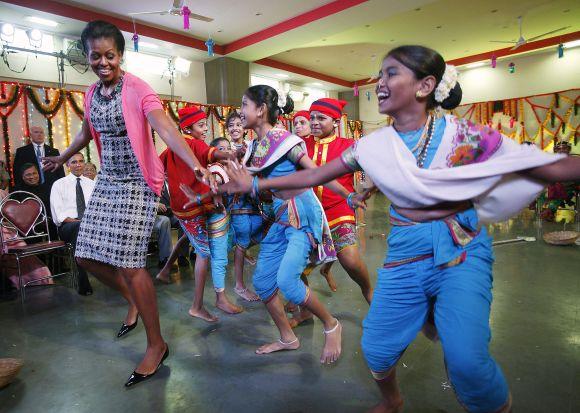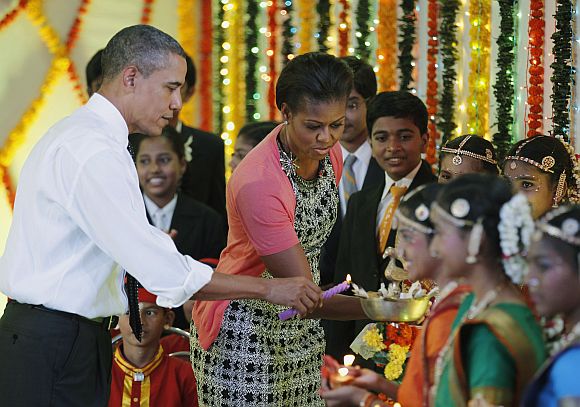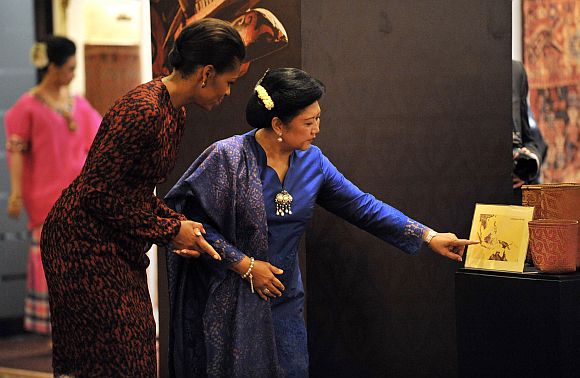 | « Back to article | Print this article |
'Michelle Obama's Mumbai dance stage managed'
The impromptu dance that First Lady Michelle Obama did at a school in Mumbai when she accompanied President Barack Obama on his India trip in 2010 was stage managed by the White House staff so as to send a positive image throughout the world, a new book has claimed.
"In Mumbai, while the President was in discussions on trade relations between the two countries, the first lady visited with a group of orphans and runaways, kicking off her shoes to play hopscotch with them, dancing and shimmying to the beat of a song from a Bollywood movie," wrote the New York Times journalist Jodi Kantor in her latest book 'The Obamas'.
"The first lady's staff knew the formula by now: put Michelle Obama in a roomful of kids -- especially kids who were outsiders in one way or another -- just let them interact, and they were likely to end with a Moment that generated warm, positive images and video," Cantor wrote.
"All we had to do was set the stage," Melissa Winter, her deputy chief of staff, said later according to the book, which has been described as highly exaggerated by White House Press Secretary Jay Carney.
Please click NEXT to read further...
'The moments helped the president in some way'
"It was the original, defining visit to the London school refined, repeated, staged again and again by East Wing staff, turned into a reliable formula to convey what she wanted to stand for on the world stage: the idea that anyone could grow up to be anything," the book says.
"The images that beamed around the world, of the first lady elegantly defying convention and caste, were the opposite of the ones from her Spain trip," the author writes.
"She looked joyful, accessible, down-to-earth -- value added," she approvingly told her team later.
"'Value-added' was a favorite Michelle-ism, one of the highest compliments she gave. It meant that the moments were beneficial to the administration; that they helped the president in some way," Cantor said.
In her widely controversial book, Cantor reflects the internal conflict in the White House in particular the alleged differences between the US President and the First Lady a few days after the November 2010 elections when the Obamas lifted off for India and Indonesia.
'If you were facing defeat at home, generate impressive photos abroad'
"It was a classic rule of the presidency: if you were facing a defeat at home, change the subject, jet off, generate impressive photos with spectacular backdrops. Some Democrats groaned: India was drawing jobs from the United States, so did the president have to go there, of all places?" Cantor wrote.
The NYT journalist wrote while some fellow Democrats may have disapproved, the trip was perfect for the President, lifting him out of dreary post loss Washington and putting him back into a world he had left behind decades ago.
"Obama had been trying to visit Indonesia, one of his childhood homes and the world's most populous Muslim nation, ever since he arrived in office, postponing twice already. He and the first lady only had time to spend half a day there, but that was enough for him to eat his favorite childhood dishes, accept a medal on behalf of his mother, who had pioneered microcredit loans for poor Indonesians, and create another memorable image of Michelle," she wrote.
'The farther he was from Washington, the more comfortable he seemed'
"He and the first lady visited the largest mosque in Jakarta, removing their shoes out of respect, huddling in conversation with the imam. The resulting photos were striking, mostly because of how different the familiar first lady looked: out of respect for Muslim tradition, she had donned a flowing yellow suit and printed headscarf for the mosque visit," Cantor wrote.
"Let people at home think they were Muslim, the Obamas seemed to be saying: in international and diplomatic terms, it was a profound gesture of respect, and pictures of it appeared in newspapers around the globe," she said.
"The President always pronounced foreign places and names with perfection, every vowel, consonant, and inflection in place. It was the Obama virtuosity again, letting no A go unplussed. But he was also challenging the stereotype of the parochial, blundering American -- exactly how his predecessor had been perceived abroad. In Jakarta, he ended his speech with the extraordinary sight of a US president speaking perfectly accented Bahasa. Once again, the farther he was from
Washington, the more comfortable he seemed," Cantor said.



